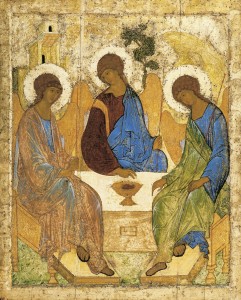“The following dissertation concerning the Trinity, as the reader ought to be informed, has been written in order to guard against the sophistries of those who disdain to begin with faith, and are deceived by a crude and perverse love of reason.”(1) Thus begins Augustine’s dissertation on the Trinity, written for those whose perverse love of reason prevents a heart of faith. Perhaps this is a warning for all of us who work so hard to logically make sense of something as ineffable and mysterious as the divine nature of God. Writing over a thousand years later, Leonardo Boff intoned a similar warning: “We should never forget that the New Testament never uses the expressions ‘trinity of persons’ and ‘unity of nature.’ To say God is Father, Son and Holy Spirit is revelation; to say that God is ‘one substance and three Persons’ is theology, a human endeavor to fit the revelation of God within the limitations of reason.”(2)
If reason is conscribed by logic, then at our best, we must speak of the Trinity in analogical terms. In other words, we look for analogies from our human experience, analogical images, pictures, or descriptions that offer an analogous explanation for that which is unexplainable. For Augustine, love best illustrated the nature of the Trinity. “Now when I, who am asking about this, love anything, there are three things present: I myself, what I love, and love itself. For I cannot love love unless I love a lover; for there is no love where nothing is loved. So there are three things: the lover, the loved and the love.”(3) From this analogy, Augustine argues that God’s nature is indeed relational and personal as it is expressed in a divine community of love. It cannot be said that God is love (1 John 4:8) if God is alone and monadic. Instead, love resides both in God’s nature as a personal being and in relationship to the beloved (Jesus Christ) by love (Holy Spirit).
While at best an analogy, Augustine’s definition communicates two key scriptural truths about God: God is both personal and relational in God’s very nature. God is not a distant being, removed from Creation, but God is personally involved in creation. Indeed, God is so personally involved that God even participated in our humanity through Jesus Christ. This is what the theological doctrine of the Incarnation communicates. As a personal God, therefore, God is relational. God is love, as the Epistle of John tells us, and that love is shared in the divine community of Father, Son, and Holy Spirit. Indeed, through love God reaches out to the creation and calls it back into relationship through the redeeming work of Jesus Christ by the transformational work of the Holy Spirit.
While this analogy isn’t intended to answer all of our logical reasoning concerning the nature of God as Trinity, it does lead us to a vital application for the Christian life. We too, as image-bearers of God, do not reflect that image solely in our own persons by ourselves. Instead, to bear the image of God as personal, relational Trinity is to be in community with one another. Relationships, as they image God, are intended to reflect the divine community of love, redemptive and reflective of the very love of God as Father, Son, and Holy Spirit. Therefore, we might ask, as a redeemed community of love, how ought we to reflect the realityof the Trinity in our world? How might we draw others into redeemed community and away from loneliness, isolation, and self-destruction?
To understand the Trinity is not simply to analyze it logically “through a crude and perverse love of reason.” Rather, to understand the Trinity is to live in the light of its implications for human communities. Far more than a logical construct of a paradoxical nature, the Trinity is to be the way in which we image God in this world through the community of believers—and not as isolated individuals. We are to call others into that community enfolded in the life of the Trinity—Father, Son, and Holy Spirit—love, lover, and beloved in divine community.
Margaret Manning Shull is a member of the speaking and writing team at Ravi Zacharias International Ministries in Bellingham, Washington.




0 Comments